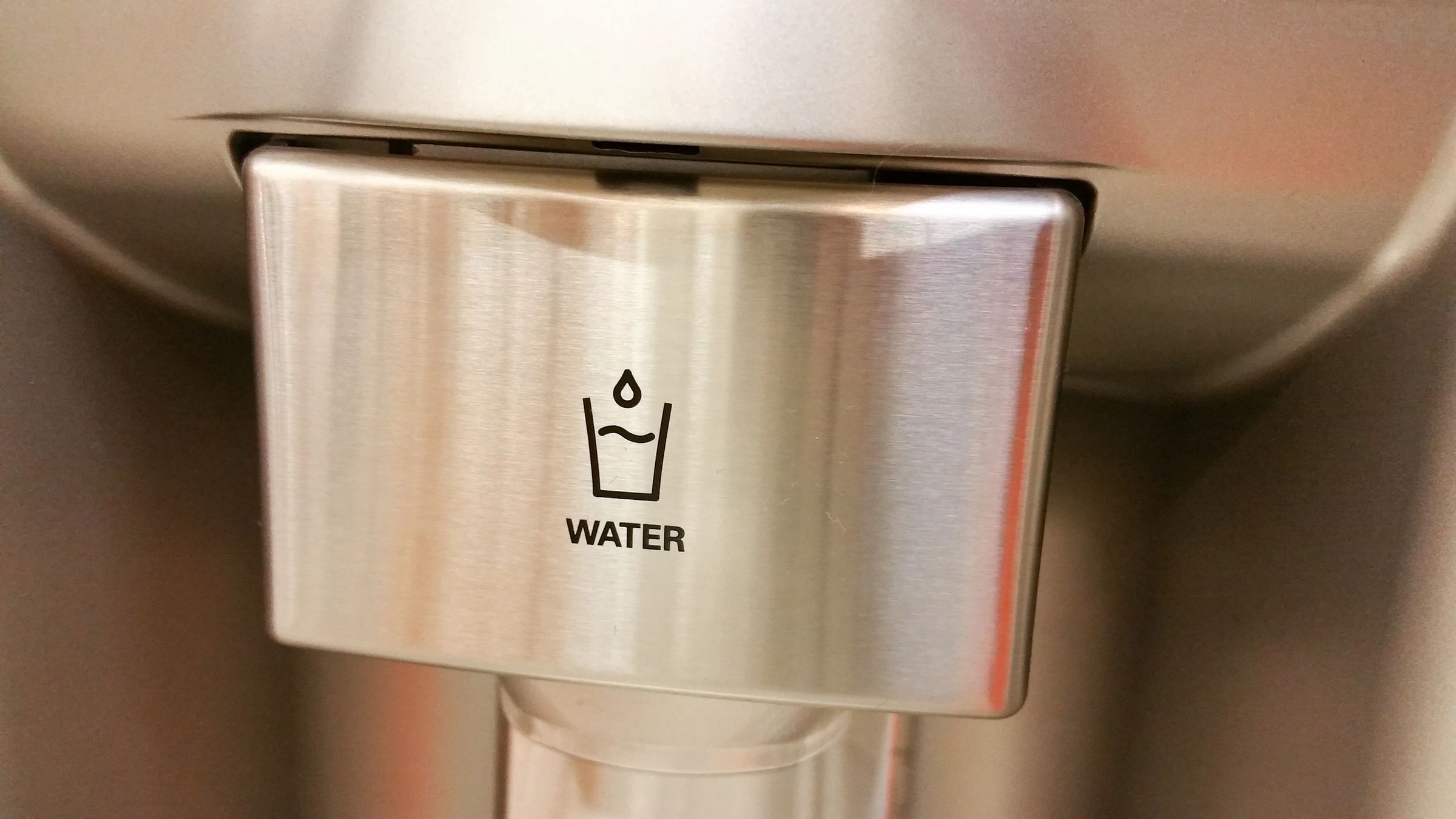No Harm in Preparing for this Terrifying Threat
There’s a real threat of lack of fresh water for many areas of the world beyond Africa, who are incredibly reliant on nearly all important imports.
Global Findings
- Four billion people — almost two thirds of the world’s population — experience severe water scarcity for at least one month each year.
- Over two billion people live in countries where water supply is inadequate for drinking and hygiene purposes on a continual basis.
- Approximately 20 percent of the world’s population does not have access to fresh drinking water. Although the Earth contains a plentiful supply of water, only 1 percent is fit for immediate human consumption.
- Just last year, Spain declared a state of emergency due to drought (and then flooding thereafter). There have been unprecedented water shortages hammer Mexico City & severely parched Zambia warns of a national disaster.
- An estimated 500 million people in Asia and the Pacific do not have access to a basic water supply
- By 2040, assuming that no changes occur (famine, added drought, wars, financial crises, trade problems, regional conflicts, etc.) 1 in 4 children worldwide will be living in areas of extremely high water stress.
- It’s estimated that developed countries who take 5 minute showers use the same level of water than used in undeveloped slums around the world throughout an entire day.
From the Global Trends 2025: A Transformed World edition by the National Intelligence Council, experts currently consider 21 countries with a combined population of about 600 million to be either cropland or freshwater scarce. With added population growth, mostly from 3rd world countries whereby water scarcity is worst, there are 36 countries (home to about 1.4 billion people) that are projected to join into this category by the end of 2025.
Increases
The increase here is 5.85X from 1901 to today. Interestingly, across this same time period, the population increased 5.1X (1.6B to 8.1B approximately) meaning there is still more water fresh water production than the increase in the worlds population.
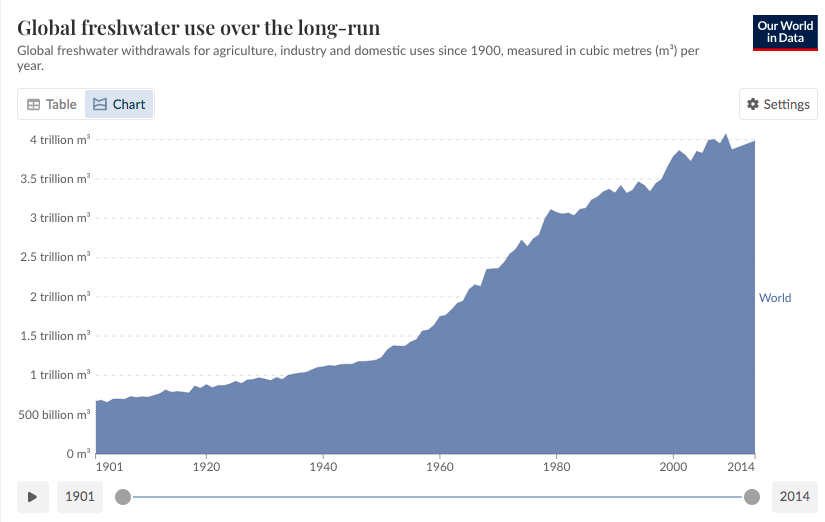
Everybody is bullish on AI and Data centres but fail to realize that they only operate with energy and water
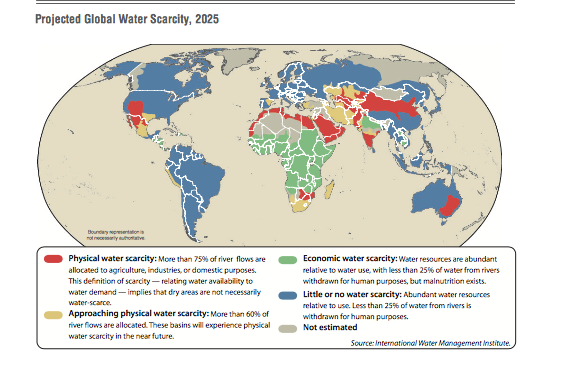
Lopsided
Despite having a higher degree of clean water production on a global basis, the number of those without water security is rising too. This signals that a small percentage have a majority of the fresh water supply and that it is becoming an increasingly rare commodity for certain areas of the world. Similar to oil, it looks like those who will have clean stable water will have a much more well-rounded and resilient economy.
As it stands globally, demand will increase for water consumption directly, as well as indirectly for agriculture (including new biopharma and biofuel crops), mining (which is required to extract all the “clean” energy metals), real estate utilities, tourism, fisheries and industry processes. Water is also required for the construction and cooling of data centres that enable AI processing and development (a race that we are currently seeing between China and the USA)–> which is important if you’re extremely bullish on the AI sector.
It is a strange dynamic where the added water demand is required for advanced economic processes in the wealthier part of the world, while the poorer part of the world have reduced water for basic living tasks.
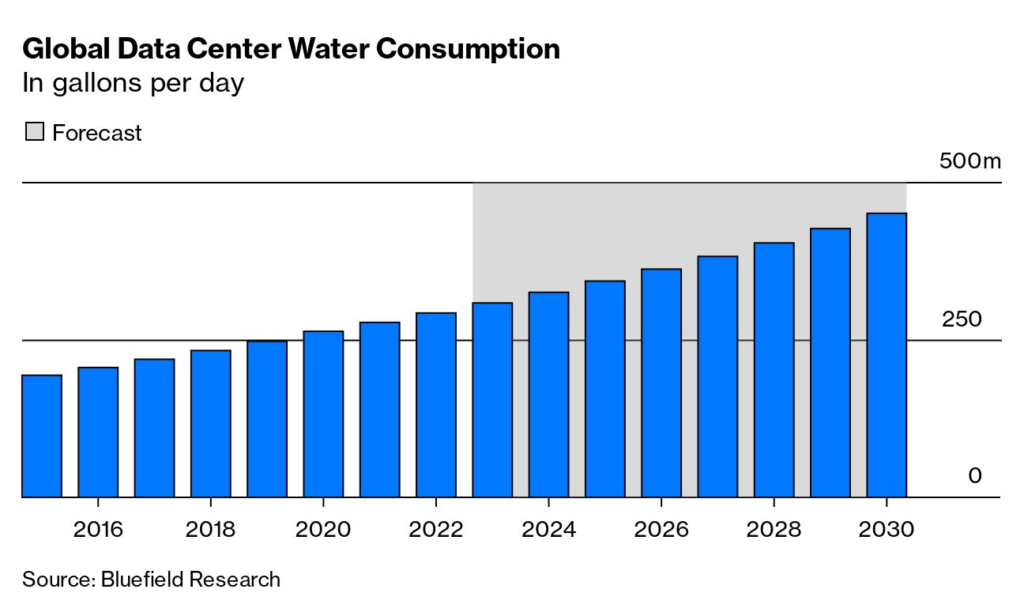
Current Water Stress, Annually
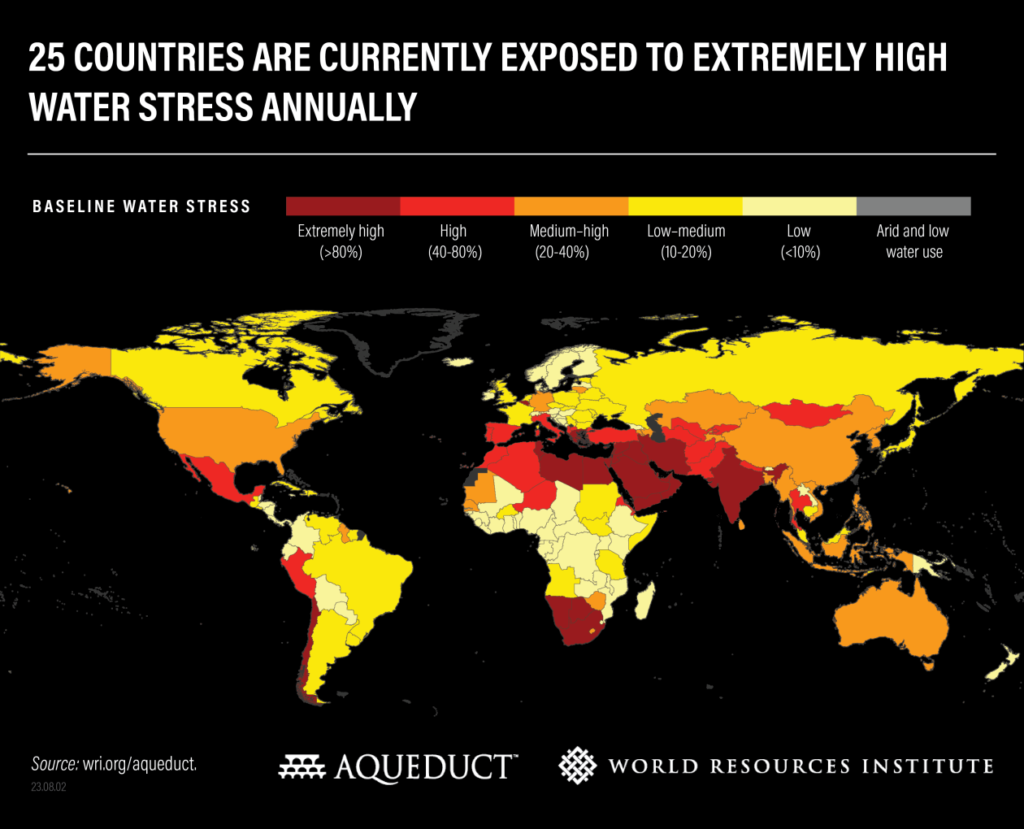
Clean Water is a must, which is why I believe this is a great investment opportunity here–> Shared with the PRO Plan Members (Major Discount Attached)
It’s very difficult to parse through the details on this topic without coming across ideological and dogmatic predictions regarding “climate change” and the fact that most humans are regarded as “polluters” to the planet. Most of the scientific papers have some agenda behind it. Regardless, we are seeing changes on the restriction of water usage allowed:
- Newsom in California has signed a law to “permanently ban” watering grass at California businesses. Earlier this year, 20,000 cubic feet of water was released into the ocean per second because there’s no place to store it. Water policy in California is as backwards as it gets, a long with everything else.
- Water curtailment policies have come into place in Idaho state as well, that is threatening hundreds of thousands of jobs indirectly– the state is on the verge of hitting a crisis without the usage of water for farming.
- The mayor of the city of Verona (Italy) has announced that watering gardens & sports fields, washing cars & patios, filling pools & swimming pools are now prohibited until the end of August to safeguard drinking water supplies. Vegetable gardens may only be watered at night
- The association for agricultural irrigation in the towns of Silves, Lagoa and Portimao in southern Portugal has already activated an emergency plan under which 1,800 farms have to halve the irrigation of some crops. Duarte Cordeiro, the Portuguese Minister for Environment and Climate Action, stated last week that despite current preparations, the country will have to live with restrictions and higher water costs in the future (Portugal).
- Civil unrest and instability: Water stress can spark civil unrest over water availability and quality of government water management practices (South Africa)
Water is a strange commodity because it’s so plentiful we assign it a very low value, despite its necessity status
Going Down The Drain
By 2050, water demand in Sub-Saharan Africa is expected to skyrocket by 163% which is 4X the rate of change compared to Latin America, the second-highest region. Latin America is expected to see a 43% increase in water demand during this same time period. The developed nations are expecting to see a plateau due to a cancelling out with falling fertility rates and hence, consumption.
Natural Aquifers:
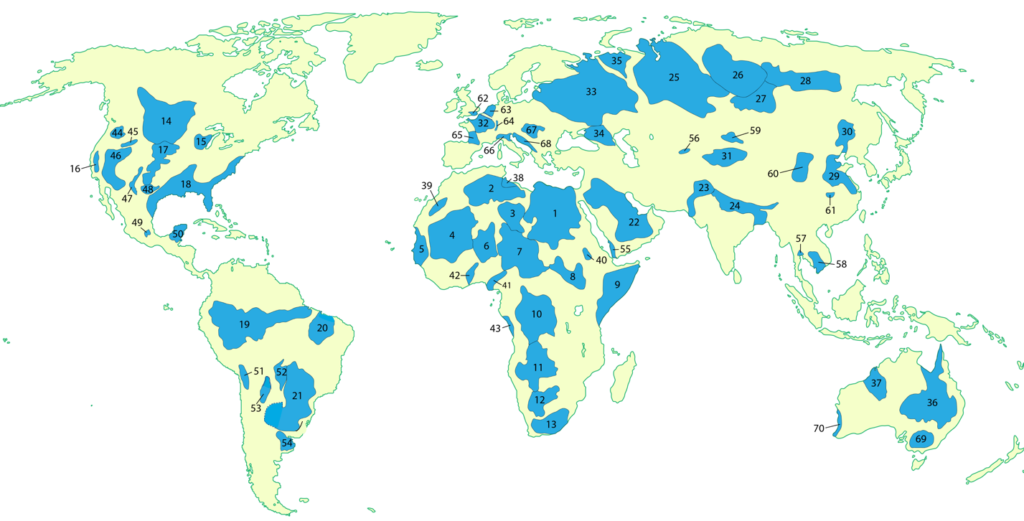
Lack of Uniformity
The problem of water is further complicated by the fact that every country, city, municipality may have radically different laws pertaining to water rights, land ownership, water usage and a market for this commodity. It is primarily in governments hands around the world–and legally it’s challenging to get on the same page.
Why we advocate for a Return to Meritocracy:
Efficiency with the viable water supply can be achieved through constant maintenance of leaky municipal infrastructure and building piping. There are no reliable global tracking data for the amount of water lost this way but numbers in the United States, in so far they can be trusted, suggest household leaks waste nearly 1 trillion gallons of water per year. From 2008 (assume worse now due to demographic shifts), we can see that some countries are incredibly leaky:

Recent EU data presents:
High leakage countries
- Bulgaria: Has the highest water leakage rate in Europe, at over 60%
- Ireland: Has a water leakage rate of 53%
- Romania: Has a water leakage rate of 41%
- Italy: Loses over three times as much water as Britain
Low leakage countries
Japan: Has a water leakage rate of 7%
Netherlands: Has a water leakage rate of around 5%
Denmark: Has a water leakage rate of 6%
Agriculture accounts for 70% of fresh water consumption; No water= No Food

Water Depends on Energy
Desalinating saltwater is an excellent option for providing more access to water supplies but it has one major drawback–> It requires a huge amount of energy to the pumps to remove the salt from the water. As long as governments tax the hell out of energy companies and regulate them out of existence, we will have artificially high energy prices that great limits the viability of desalination.
Of course, the climate freaks will say we can’t do this because we’ll be burning [clean] natural gas, so they’d rather have everything die including their precious lives instead. At least then we can all be equal, the whole world will be hungry, poor and miserable–the communist utopia will be complete.
Water is even being used as a tool of warfare.

Closing
Water is increasingly gaining the attention it deserves both as a crucial factor in the next phase of industrial processes and its growing problem for significant populations on the planet. Water has an interesting trait of holding a low value despite having an inherently high worth. At some point, I believe this worth will be realized.
I love the investment line, “Buy things that people may hate or ignore…but that we cannot live without”. In fact I used it in my investment guidebook (which is on sale for you now below!)
Please check out our subsidiary company that evaluates factors such as water, food, crime before providing consulting advice for you and your family in developing a Plan B and Plan C.
https://opendoorconsultancy.net
Don’t forget, our PRO Plan explores business opportunities to take advantage of this problem before anyone else!
#StayOnTheBall

